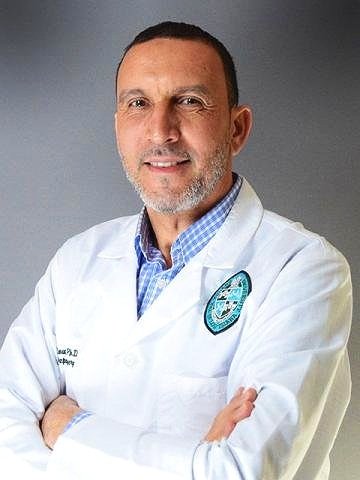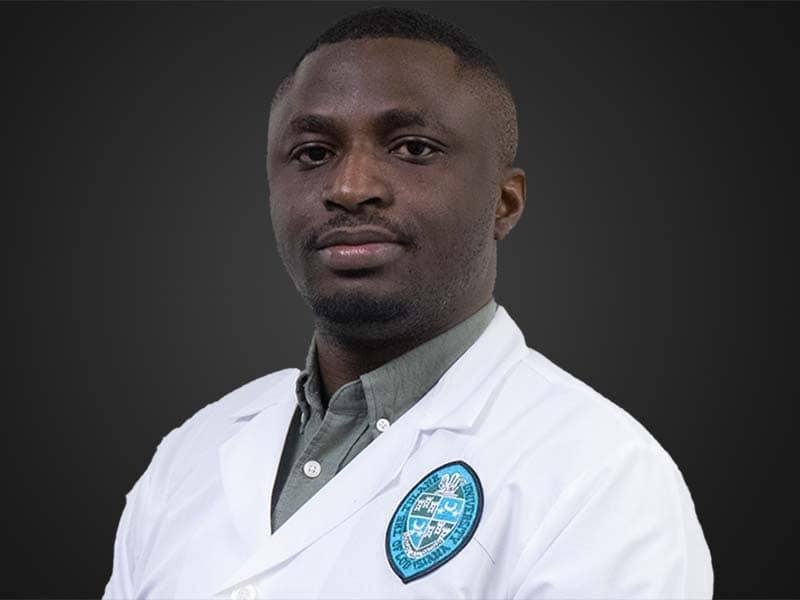Eman Toraih, MD, MSc, PhD, DBio
Assistant Research Professor, Division of General, Endocrine, and Oncological Surgery
Dr. Eman Toraih is Assistant Research Professor in the Department of Surgery at Tulane University School of Medicine. She received the MD degree in 2002 and MSc/PhD degrees in Medical Genetics in 2014 from Suez Canal University in Egypt. During her time there, she taught Molecular Genetics, Cancer Genomics, and Bioinformatics to medical students and served as head of the Molecular Lab in the Center of Excellence of Molecular and Cellular Medicine which was founded in 2015. Her research focused on cancer genetics, one project which focused on the genetic makeup of brain cancer patients. Her various works were presented at various local and international conferences where Dr. Toraih received numerous awards.
At Tulane, she has developed a network of multidisciplinary and international collaborators in a short time, bringing together world-class researchers with varying skill sets to achieve common goals. She helps students, fellows, residents, and faculty members to broaden their horizons by learning new subjects and techniques in basic science and clinical research activities. Dr. Toraih’s work has shed light on the utility and benefits of new thyroid cancer biomarkers for active surveillance. She identified a prognostic molecular panel that accurately predicts the risk of tumor specimens developing aggressive behavior. Dr. Toraih was awarded the Carol Lavin Bernick Faculty Grant in 2020, Louisiana Clinical & Translational Science Center grant in 2021, and recently received an American Thyroid Association research grant funded by Bite Me Cancer and Thyroid Cancer Survivors’ Association. Her findings assist clinicians in determining the frequency and modality of follow-up studies to better serve patients with thyroid cancer, with the goal of making a significant positive impact on thyroid cancer survival rates and reducing the aggregate cost of thyroid cancer treatment in the United States.
On the leadership side, Dr. Toraih proactively introduced OncoLand and DiseaseLand bioinformatics software into Tulane University School of Medicine, providing students and faculty with access to hundreds of curated and quality-controlled public cancer and non-cancer datasets. Dr. Toraih is also the administrator of Ingenuity Pathway Analysis software at Tulane University. Apart from her high adaptability during COVID-19 crisis, Dr. Toraih is also committed to community service. She is engaged in several volunteer activities to provide aid to the homeless, serve meals and basic supplies to those in need, and help communities affected by hurricanes.
Mohamed Shama, MD, MSc, MRCS, EBSQ
Assistant Professor, Division of General, Endocrine, and Oncological Surgery
Dr. Mohamed Shama is Assistant Professor in the Department of Surgery at Tulane University School of Medicine. He received the MD degree in 2002 from Cairo University School of Medicine. After fulfilling teaching and clinical responsibilities in Egypt for almost a decade, he completed research fellowships at Harvard Medical School and Tulane and clinical fellowships in head and neck oncology and microvascular reconstruction at the University of Florida and Henry Ford Health System. Upon completion of his impressive training, he returned to Tulane as a full-time attending physician. He is an avid mentor and is highly sought out by medical students, residents, and fellows.
Dr. Shama received membership in the Royal College of Surgeons of England in 2008. He received his board certification in Surgical Oncology by the European Society of Surgical Oncology in 2014. His clinical interests include thyroid and parathyroid surgery, salivary gland tumors, skin cancers, and microvascular reconstruction of the head and neck.
Dr. Shama’s research interests involve mimicking tumor micro-environments and the re-differentiation of cancer cells after mesenchymal-epithelial transition.
Mourad Zerfaoui, PhD
Assistant Professor, Department of Surgery
Dr. Mourad Zerfaoui is Assistant Professor in the Department of Surgery at Tulane University School of Medicine. He received the PhD degree in Cancer and Molecular Biology in 1999 from the prestigious University of Aix-Marseille in France. He completed his post-doctoral training there in 2005 as well as at LSU Health Sciences Center in 2010.
Dr. Zerfaoui has an extensive background in cancer research with specific training and expertise in cancer-related inflammation and signal transduction pathways, which are implicated in the modulation of cancer progression, metastasis, and DNA repair. As co-investigator and head scientist on federally funded grants, he has successfully collaborated with national and international researchers. Dr. Zerfaoui has published 32+ articles in peer-reviewed journals in basic and translational sciences, maintained membership in several scientific associations, and served as an ad hoc reviewer in a number of scientific journals. He also had the chance to work with Dr. Hamid Boulares (Professor of Pharmacology at LSU Health Sciences Center) on the role of PARP-1/NF-kB in cellular trafficking and nuclear transport machinery of CRM-1.
Dr. Zerfaoui’s current focus is on studying the significance of the mutant BRAF V600E localization in thyroid cancer and melanoma with Dr. Mohammed Hussein and how this kinase contributes to treatment resistance and poor prognosis.
Mohammed Hussein, MD, MSc
Research Scientist, Department of Surgery
Dr. Mohammed Hussein is a Research Scientist in the Department of Surgery at Tulane University School of Medicine. He received the MD degree from Cairo University School of Medicine in 2000 and completed his surgical training in 2007 from Suez Canal University in Egypt. In 2015, he earned the MSc degree in Chest Diseases where his dissertation investigated the haplotypes of the β2-adrenergic receptor gene and bronchodilator response in Egyptian patients with chronic obstructive pulmonary disease.
Dr. Hussein’s research interests involve organizing the pipeline of hospital informatics and exploring national databases to predict management outcomes and investigate meaningful insights for direct patient care. He works in multidisciplinary fields including endocrine, cancer, trauma, cardiovascular, pulmonary, and COVID-19. His current focus is on studying the significance of the mutant BRAF V600E localization in thyroid cancer and melanoma with Dr. Mourad Zerfaoui and how this kinase contributes to treatment resistance and poor prognosis.
Solomon Alhassan, PhD
Research Scientist, Department of Surgery
Dr. Solomon Alhassan is a Research Scientist in the Department of Surgery at Tulane University School of Medicine. He received the PhD degree from Universidad Austral de Chile in Chile in 2021, where his dissertation emphasized endocrine disruption and small regulatory RNAs in exosomes in teleosts. Shortly after, he arrived to Tulane as a postdoctoral research scientist.
Dr. Alhassan research interests involve applying the tools of molecular and computational biology in developing novel biomarkers and molecules for minimally invasive diagnosis and management of cancers. He is also experienced and interested in translating basic science research to public health policy.




